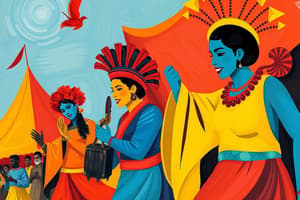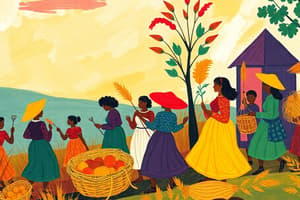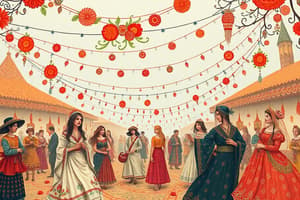Podcast
Questions and Answers
What is the purpose of Seasonal Festivals?
What is the purpose of Seasonal Festivals?
- To showcase various art forms
- To attract visitors and promote tourism in a particular region
- To acknowledge the cyclical nature of life and connect with the natural world (correct)
- To celebrate the heritage and traditions of specific ethnic groups
Which type of festivals aim to showcase local talent and generate revenue for local businesses?
Which type of festivals aim to showcase local talent and generate revenue for local businesses?
- Processions
- Music and dance festivals
- Tourism Festivals (correct)
- Cultural Festivals
What kind of events involve public displays that include walking, dancing, or other forms of movement?
What kind of events involve public displays that include walking, dancing, or other forms of movement?
- Music and dance events
- Art events
- Processions (correct)
- Trade shows and exhibitions
What do festivals like the Indian Holi Festival and the Chinese Dragon Boat Festival aim to celebrate?
What do festivals like the Indian Holi Festival and the Chinese Dragon Boat Festival aim to celebrate?
Which aspect is NOT a benefit of festivals as mentioned in the text?
Which aspect is NOT a benefit of festivals as mentioned in the text?
Flashcards are hidden until you start studying
Study Notes
Celebrating Communities Through Festivals
Festivals are colorful, lively events that gather people from all walks of life to share in the joy of community, tradition, and celebration. Throughout history and across cultures, festivals serve as a means to honor heritage, mark significant occasions, and foster a sense of unity. Here, we'll explore the various forms these celebrations take and their importance in our global society.
Definition and Purpose
In its most basic form, a festival is a planned event that brings people together to celebrate or commemorate a particular occasion. The exact purpose of a festival can vary from marking religious or historical events to promoting tourism, art, music, or dance. Festivals can embrace a wide range of themes, such as harvest, cultural heritage, environmental awareness, or even the simple pleasure of gathering together.
Types of Festivals
-
Religious Festivals: These celebrations are usually tied to various faiths and beliefs, such as Hindu Diwali, Christian Carnival, or Buddhist Vesak Day. They provide an opportunity to reaffirm and strengthen religious convictions, as well as to foster a sense of communal identity.
-
Historical Festivals: These events are held to commemorate significant historical events or figures. Examples include the Chinese Lunar New Year, the Canadian National Aboriginal Day, or the American Independence Day. These celebrations serve to remind us of our shared history and heritage.
-
Seasonal Festivals: These festivals are often tied to natural occurrences or agricultural cycles. They include events like the Brazilian Carnival, the Canadian Maple Syrup Festival, or the British Harvest Festival. These celebrations acknowledge the cyclical nature of life and provide an opportunity to connect with the natural world.
-
Cultural Festivals: These events are held to celebrate the heritage and traditions of specific ethnic or cultural groups. They include celebrations like the Indian Holi Festival, the Chinese Dragon Boat Festival, or the Brazilian Samba Festival. These festivals provide an opportunity to learn about different cultures and to foster a sense of appreciation and respect for diversity.
-
Tourism Festivals: These events are organized to attract visitors and promote tourism in a particular region, country, or city. They include events like the Chinese Lantern Festival, the Canadian Ice Hotel Festival, or the British London Fashion Week. These festivals provide an opportunity to showcase local talent and to generate revenue for local businesses.
Festival Formats
Festivals can take many different forms, such as:
-
Processions: These are public displays that involve walking, dancing, or other forms of movement. Examples include the Chinese New Year Dragon dance or the Brazilian Carnival Parade.
-
Music and dance: These events showcase various music and dance forms. Examples include the Indian Diwali celebration or the Brazilian Samba Festival.
-
Art: These events showcase various art forms. Examples include the British Royal Academy Summer Exhibition or the Canadian Vancouver Biennale.
-
Food: These events showcase various food and culinary traditions. Examples include the Brazilian Brazilian Feijoada Festival, the Chinese Chinese Dumpling Festival, or the Indian Thalipeeth Festival.
-
Trade shows and exhibitions: These events showcase various products, services, and technologies. Examples include the British London Book Fair or the Canadian National Trade Show.
Benefits of Festivals
-
Cultural enrichment: Festivals provide an opportunity to learn about different cultures and to foster a sense of appreciation and respect for diversity.
-
Community unity: Festivals bring people together to share in the joy of community, tradition, and celebration. They provide an opportunity to connect with neighbors and to foster a sense of belonging.
-
Economic growth: Festivals attract visitors and promote tourism in a particular region, country, or city. They provide an opportunity to showcase local talent and to generate revenue for local businesses.
-
Historical preservation: Festivals serve to remind us of our shared history and heritage. They provide an opportunity to connect with the past and to foster a sense of continuity.
-
Environmental awareness: Festivals provide an opportunity to raise awareness about environmental issues and to promote sustainable practices. They provide an opportunity to connect with the natural world and to foster a sense of reverence for the environment.
Festivals are vibrant, lively events that bring people together to celebrate and share in the joy of community, tradition, and culture. They provide an opportunity to learn about different cultures and to foster a sense of appreciation and respect for diversity. Festivals are essential components of our global society, and they serve to remind us of our shared history and heritage. So next time you attend a festival, remember to embrace the joy of community, to celebrate the richness of culture, and to foster a sense of appreciation and respect for diversity.
Studying That Suits You
Use AI to generate personalized quizzes and flashcards to suit your learning preferences.




